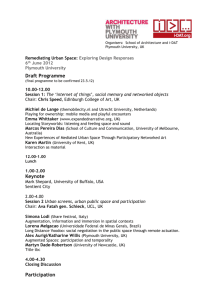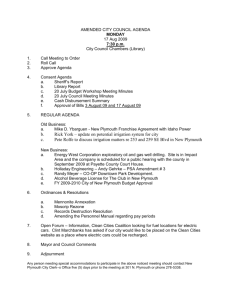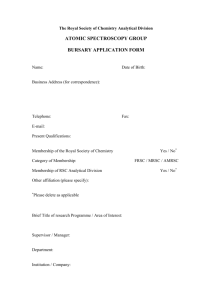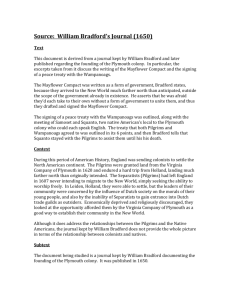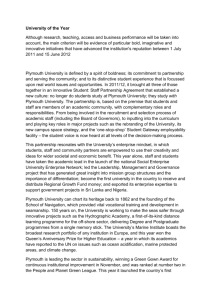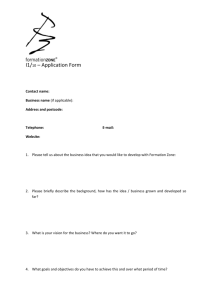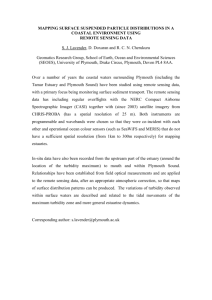Religious Controversies in Plymouth Colony
advertisement
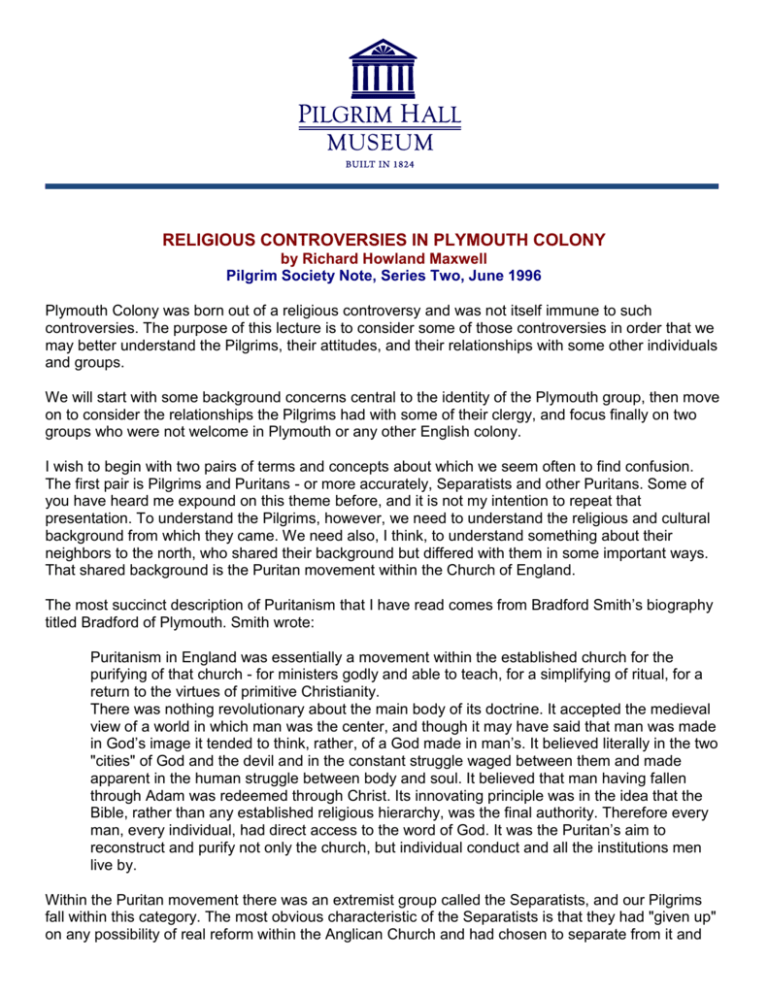
RELIGIOUS CONTROVERSIES IN PLYMOUTH COLONY by Richard Howland Maxwell Pilgrim Society Note, Series Two, June 1996 Plymouth Colony was born out of a religious controversy and was not itself immune to such controversies. The purpose of this lecture is to consider some of those controversies in order that we may better understand the Pilgrims, their attitudes, and their relationships with some other individuals and groups. We will start with some background concerns central to the identity of the Plymouth group, then move on to consider the relationships the Pilgrims had with some of their clergy, and focus finally on two groups who were not welcome in Plymouth or any other English colony. I wish to begin with two pairs of terms and concepts about which we seem often to find confusion. The first pair is Pilgrims and Puritans - or more accurately, Separatists and other Puritans. Some of you have heard me expound on this theme before, and it is not my intention to repeat that presentation. To understand the Pilgrims, however, we need to understand the religious and cultural background from which they came. We need also, I think, to understand something about their neighbors to the north, who shared their background but differed with them in some important ways. That shared background is the Puritan movement within the Church of England. The most succinct description of Puritanism that I have read comes from Bradford Smith’s biography titled Bradford of Plymouth. Smith wrote: Puritanism in England was essentially a movement within the established church for the purifying of that church - for ministers godly and able to teach, for a simplifying of ritual, for a return to the virtues of primitive Christianity. There was nothing revolutionary about the main body of its doctrine. It accepted the medieval view of a world in which man was the center, and though it may have said that man was made in God’s image it tended to think, rather, of a God made in man’s. It believed literally in the two "cities" of God and the devil and in the constant struggle waged between them and made apparent in the human struggle between body and soul. It believed that man having fallen through Adam was redeemed through Christ. Its innovating principle was in the idea that the Bible, rather than any established religious hierarchy, was the final authority. Therefore every man, every individual, had direct access to the word of God. It was the Puritan’s aim to reconstruct and purify not only the church, but individual conduct and all the institutions men live by. Within the Puritan movement there was an extremist group called the Separatists, and our Pilgrims fall within this category. The most obvious characteristic of the Separatists is that they had "given up" on any possibility of real reform within the Anglican Church and had chosen to separate from it and start their own churches. But Separatism went beyond just a cynical break from their "other church." It had a deep philosophical grounding going all the way back to Scripture and involving the belief that Christians must separate themselves from the world. Phrasing it more positively, perhaps, Robert Merrill Bartlett (whom many of us had the privilege of knowing personally) described the Plymouth Separatists as "a people set apart for the purpose of building a community patterned after the heavenly city," and then quoted John Robinson The main ends for which the Lord gathereth and preserveth his church upon earth are that he might have a peculiar people, separated unto himself, from all other peoples, to call upon his name in faith and to glorify him, their heavenly Father in their holy conversation, whom he also might glorify in the end of their faith, the salvation of their souls. Other Separatist principles included the separation of church and state, and - for the most radical among them - separation from all other religious communions. Our Plymouth forebears were among the least radical of Separatist groups. Though their Separatism represented a major difference between the Pilgrims and the non-Separatist Puritans who settled Massachusetts Bay, there was a strong enough friendship between the two groups that when a church was organized at Salem in 1629 - the second English congregation to be established on these shores and, of course, officially Anglican - Governor Bradford and some others made a perilous trip to Salem to "extend the right hand of fellowship, wishing all prosperity and a blessed success unto such good beginnings." Moreover, the Plymouth Separatists were willing to share in worship with other Christian groups, including the Church of England - an idea which had much to do with the controversy between the Pilgrims and one of their most famous ministers, Roger Williams. The other pair of terms that we need to consider is Saints and Strangers. The popularity of George Willison’s history by that title has created an awareness of the differences between the two groups on the Mayflower, but the book itself makes rather more than seems necessary of those differences. The Saints were the Separatists whose primary motivation in making the journey was the establishment of a colony in which they could have the sort of church they wished. The Strangers were non-Separatists - or at least no members of the Separatist group that had fled to Holland and thence to North America. Their primary motivations in coming here were other than religious; for most of them, apparently, they were economic. The Saints established their community and church - and the two were essentially one and the same. For that reason, many moderns - looking back from the perspective of the culture we know with its acceptance of an almost limitless variety of religious beliefs and groups - evaluate Pilgrim Plymouth as a less than tolerant community because it did not make room for other groups or points of view. I would plead for a reappraisal of that judgment. In fact, all that the Pilgrims had known in England, and all that most of the world’s people knew in the early seventeenth century, was a community with a single church. More important, that church - defined by the Separatist Puritans as the gathered Covenant community - was the "glue" that held early Plymouth colony together. Much that happened in the period we’re considering happened out of the necessity for survival rather than because of intolerance. In any case, the relationships between the Saints and Strangers were not as strained as some would have us believe. There was that famous incident on Christmas day, 1621. Let Governor Bradford describe it for us: And herewith I shall end this year. Only I shall remember one passage more, rather of mirth than of weight. On the day called Christmas Day, the Governor called them out to work as was used. But the most of this new company excused themselves and said it went against their consciences to work on that day. So the governor told them that if they made it a matter of conscience, he would spare them till they were better informed; so he led away the rest and left them. But when they came home at noon from their work, he found them in the street at play, openly; some pitching the bar, and some at stool-ball and such like sports. So he went to them and took away their implements and told them that was against his conscience, that they should play and others work. If they made the keeping of [Christmas] a matter of devotion, let them keep their houses; but there should be no gaming or reveling in the streets. Since which time nothing hath been attempted that way, at least openly. And Robert Bartlett summarized the relationship between the Saints and Strangers this way: If the "Saints" in general upheld the Pilgrim ethics, what of the Strangers"? It should be pointed out that the cleavage was not wide between these two classifications. "Strangers" were nonmembers on leaving England or Holland, but most of them joined the church in Plymouth. They knew in advance that this was a community deeply concerned with religion. Even the indentured workers who came on a contract, which obligated them to pay back their travel expenses before they could be free to work and live on their own, must have felt some affinity with the Pilgrim cause or they would not have signed up. "Controversy" may be too strong a word for the area I want to consider next, but the relationships between the Pilgrims and many of the ministers that came to Plymouth in the early years were surely strained. To begin with, the Pilgrims retained their intense loyalty to John Robinson until they received word of his death. The decision that he would not make the trip in 1620 was shared by the entire community back in Holland. They had carefully considered the options and decided that, if the majority of them should make the journey, their pastor would join them and the ruling Elder would stay with the smaller group in Leyden. Conversely, if the majority stayed in Holland, Robinson would stay with them and Brewster would make the trip; that, of course, is what happened. As the years went on, apparently the Merchant Adventurers were unable or unwilling to underwrite a trip for Robinson. Probably they were unwilling, hoping instead to force Plymouth to accept a non-Puritan or at least non-Separatist minister. The first minister to come to Plymouth was William Morrell, brought by Captain Robert Gorges in 1623. Gorges himself had a new charter for a tract of land north of Plymouth and a commission from the Council for New England "to be general Governor." Morrell also had some credentials. He was an ordained minister of the Church of England and carried "authority of superintendency" over all churches in New England. He stayed only a year and not only did he not exercise his "superintendency," but he apparently carried out no clerical functions and spent his time writing poetry in Latin. Next came the infamous John Lyford. He appears to have arrived in 1624, probably on the Charity and definitely in the company of one John Oldham and a group that came "on their own particular." There’s some question about Lyford’s ministerial credentials, but no question about his reputation. It contains such an outstanding amount of sexual misconduct that Samuel Eliot Morison called him "Lewd John Lyford." The first issue which concerned the Pilgrims about Lyford was one of ordination. Separatists believed that proper ordination of a minister must be by the church he would serve, not by action of a bishop or church hierarchy. Simply put, they did not accept Lyford as an ordained minister, and that became controversial when they learned that he had privately baptized a child of one of the "Particulars." But John Lyford is best remembered for actions more perfidious than that. It’s a long story that Eugene Stratton manages to tell in a single paragraph: In 1624 two of the newer settlers, the Reverend John Lyford, who favored the Church of England and was an opportunist, and John Oldham, an adventurer in the modern sense of the word, brought to a head a number of complaints against the colony’s government. Lyford sent letters with passing ships to various people in England in an attempt to alienate influential supporters from the colony’s leaders. Bradford got word of this, and, going aboard one of the ships, he seized some letters and copied them, letting the originals go. Bradford then had a confrontation with Lyford and Oldham with the entire colony present. At first Lyford denied the accusations. When Bradford produced copies of his letters, Lyford excused himself by saying that he had merely been repeating what others were complaining about, mentioning John Billington, a rather undisciplined "stranger" who had come on the Mayflower, and some others whom Bradford did not identify. Billington and the others denied Lyford’s accusations, saying that they might sometimes have gone to Lyford’s meetings, but would not have consented to his proposals. Most likely Billington and the other dissidents had gone much further in supporting Lyford than they would admit, and many of the others are assumed to be among those who departed the colony in the next year or so. Bradford wrote to Robert Cushman on 9 June 1625, "We have rid ourselves of the company of those, who have been so troublesome unto us." Oldham and Lyford were expelled from Plymouth’ Oldham left immediately, but Lyford was allowed to stay for six months. Both later were involved in other adventures in New England. The initiative was next picked up by one of the Pilgrims’ own, Isaac Allerton, but the results were not a whole lot better. As Bradford described it: This year Mr. Allerton brought over a young man for a minister to the people here, whether upon his own head or at the motion of some friends there I well know not. But it was without the church’s sending, for they had been so bitten by Mr. Lyford as they desired to know the person well whom they should invite amongst them. His name was Mr. Rogers; but they perceived upon some trial that he was crazed in his brain, so they were fain to be at further charge to send him back again the next year, and lose all the charge that was expended in his hither bringing, which was not small by Mr. Allerton’s account in provisions, apparel, bedding, etc. After his return he grew quite distracted, and Mr. Allerton was much blamed that he would bring such a man over, they have charge enough otherwise. Three years had passed between the departure of John Lyford and the arrival of Mr. Rogers. Unfortunately, during that time the Pilgrims had received word of the death of the one pastor to whom they were committed, John Robinson. So there was a new urgency in their search, and finally it bore fruit! In 1629, they were able to ordain and "settle" the first "official" minister of the Pilgrim Church. His name was Ralph Smith, and William Bradford described his arrival this way: I had like to have omitted another passage that fell out the beginning of this year. There was one Mr. Ralph Smith and his wife and family that came over into the Bay of the Massachusetts, and sojourned at present with some straggling people that lived at Nantasket. Here being a boat of this place, putting in there on some occasion, he earnestly desired that they would give him and his passage for Plymouth, and some such things as they could well carry, having before heard that there was likelihood he might procure house room for some time till he should resolve to settle there if he might, or elsewhere as God should dispose, for he was weary of being in that uncouth place and in a poor house that would neither keep him nor his goods dry. So, seeing him to be a grave man and understood he had been a minister, though they had no order for any such thing, yet they presumed and brought him. He was here accordingly kindly entertained and housed and had the rest of his goods and servants sent for, and exercised his gifts amongst them and afterwards was chosen into the ministry and so remained for sundry years. Smith had actually come over to Salem but did not stay there because he was a Separatist. He served the Plymouth church for seven years (1629-1636), but a note in the Plymouth Church Records indicates that "he proved but a poor help to them in that, being of very weak parts." For about three years of Smith’s ministry in Plymouth, he had an associate. In the separatist tradition, whenever it was possible, the ministry was shared by more than one ordained person. The "minister" apparently was expected to spend most of his life in prayer. S "teacher" would work with the "minister," doing most of the work of teaching and preaching. Ralph Smith’s "teacher" associate is more remembered in history than Smith himself; his name was Roger Williams. Like Smith, Williams had come to Plymouth by way of Massachusetts Bay Colony, where he chose not to stay, despite having had good offers from both Boston and Salem, because they were not Separatists. Once again, I will defer to Governor Bradford for a description of what happened with Roger Williams: Mr. Roger Williams, a man godly and zealous, having many precious parts but very unsettled in judgment, came over first to the Massachusetts; but upon some discontent left that place and came hither, where he was friendly entertained according to their poor ability, and exercised his gifts amongst them and after some time was admitted a member of the church. and his teaching well approved, for the benefit whereof I still bless God and am thankful to him even for his sharpest admonitions and reproofs so far as they agreed with truth. He this year began to fall into some strange opinions, and from opinion to practice, which caused some controversy between the church and him. And in the end some discontent on his part, by occasion whereof he left them something abruptly. Yet afterwards sued for his dismission to the church of Salem, which was granted, with some caution to them concerning him and what care they ought to have of him. But he soon fell into more things there, both to their and the government’s trouble and disturbance. I shall not need to name particulars; they are too well known now to all, though for a time the church here went under some hard censure by his occasion from some that afterwards smarted themselves. But he is to be pitied and prayed for; and so I shall leave the matter and desire the Lord to show him his errors and reduce him into the way of truth and give him a settled judgment and constancy in the same, for I hope he belongs to the Lord, and that He will show him mercy. It was the "strange opinions" to which Bradford referred that caused controversy between Williams and the Plymouth flock. Indeed, some found his opinions so strange that they said of Williams that it had pleased God "to put a windmill in his head." Some of those strange opinions were "that it is not lawful for an unregenerate man to pray, nor to take an oath, and in special not the oath of fidelity to the civil government; nor was it lawful for a godly man to have communion, either in family prayer, or in an oath, with such as they judged unregenerate; also, that it was not lawful so much as to hear the godly ministers of England, when they occasionally went thither." One in our time could well wish that another of Williams’ "strange opinions" had gained wider acceptance; it might have prevented much pain over the almost four centuries that have since passed. It was that only the Indians, not the English crown, could give land on this continent to the English settlers. Williams left Plymouth and returned to Salem. His "strange opinions" were even less welcome there, and he was expelled from Massachusetts Bay Colony by action of the General Court. It’s interesting to note that, in 1936, in honor of Rhode Island’s tercentenary, the Massachusetts Legislature pardoned Roger Williams and revoked the order of banishment! The rest of the Williams story is fairly well known. He removed to a place in Rhode (then called Aquidneck) Island and founded a settlement he called Providence. It provided what neither Massachusetts nor Plymouth did: true religious freedom that made room for a wide variety of groups. True to his beliefs, Roger Williams purchased the land for Providence from Narraganset Chief Canonicus and his nephew Miantonomo. For a while, Williams himself was a Baptist and formed what is generally regarded as the first Baptist Church in America. He also welcomed the Quakers, with whom he never did agree. He developed a ministry to and friendship with the Indians and wrote a "Key" to their language. In time, Roger Williams himself rejected the Baptist church and became a Seeker who apparently never did align himself with another formal religious organization. The remaining four ministers on my list must be considered in somewhat less detail. After Williams and Smith had both left Plymouth, Edward Winslow sought a replacement in England. He located a Mr. Glover, who agreed to come, but took sick and died before departure. Winslow did find a replacement in John Norton, who agreed to the trip only with the understanding that he would look the place over, but if he thought he’d be happier elsewhere he would reimburse the Pilgrims for his travel expenses and move on. According to Bradford, "He stayed about a year with them after he came over, and was well liked of them and much desired by them; but he was invited to Ipswich, where were many rich and able men and sundry of his acquaintance. So he went to them and is their minister. About half of the charge was repaid, and the rest he had for the pains he took amongst them." It was a long time coming, but in the replacement of Norton, the Pilgrims finally obtained a minister whom they liked and who would stay with them for 18 years. His name was John Rayner, and Bradford described him as, "an able and a godly man … and of a meek and humble spirit, sound in the truth and every way unreproveable in his life and conversation. Whom after some time of trial they chose for their teacher, the fruits of whose labors they enjoyed many years with much comfort, in peace and good agreement." Despite the longevity of his ministry, Rayner’s role was officially that of "teacher," and for part of his time in Plymouth, Rayner was cast in the role of associate to another minister who was to "make a name for himself": Charles Chauncy. Chauncy’s ministry in Plymouth was less than three years in length, coming between 1638 and 1641. It was marked by controversy over baptism. Chauncy held that baptism ought to be by dipping, putting the whole body under water, and that sprinkling was unlawful. Bradford’s response: "The church yielded that immersion or dipping was lawful but in this cold country not so convenient." Chancy moved from Plymouth to Scituate in 1641. He was involved in controversy there as well, but went on to become the second president of Harvard College. The Pilgrim Church did have its share of "minister problems." But as we conclude this area of our consideration, I would moderate that with a quotation from another man who lived through much of it, Plymouth Court Secretary Nathaniel Morton: The Lord was pleased of his great goodness, richly to accomplish and adorn the colony of Plimouth, as well as other colonies in New England, with a considerable number of godly and able gospel preachers, who then being dispersed and disposed of to the several churches and congregations thereof, gave light in a glorious and resplendent manner, as burning and shining lights. We come now to those two groups which I said were not welcome in Plymouth or any other English colony. In an entirely different context, but one relating to a question that came up at an earlier lecture in this series, Samuel Eliot Morison wrote: Each Freeman had to apply for the privilege [of Freeman status]. If approved, he was admitted at a formal court and took an oath to uphold the authorities and abide by the laws. After settlements were made outside Plymouth Town, a candidate for Freeman had to be passed upon first by his neighbors. In 1671, a property qualification of twenty pounds was set up, and testimony that the applicant was "sober and peaceable" and "orthodox in the fundamentals of religion," was required. That was meant to exclude Baptists and Quakers. Neither the Baptists nor the Quakers were welcome in Plymouth, Massachusetts Bay, any other English colony, nor England itself. So the attitude toward the groups by the Plymouth colonists is little more than a reflection of a much more widely held attitude. But let’s see what it was that made these groups so unpalatable. The rejection of the Baptists reaches back to a group that preceded the Baptists who came to seventeenth-century America. They were called Anabaptists, and they originated in Germany during Martin Luther’s Reformation, which the Anabaptists felt had not gone far enough, especially with regard to baptism. The one thing that the Anabaptists and more modern Baptists hold in common is a belief that baptism should be for adults only - that it calls for a commitment that only an adult can make, and which cannot be made for any person by another. That much Baptists and Anabaptists share. The earlier Anabaptists, however, had more radical ideas than that. For a time, they had a strong visionary or Apocalyptic emphasis in their teaching and used their visions to justify some socially unacceptable actions such as polygamy. More to the point for the group at Plymouth, probably, the Anabaptists had repudiated oaths and believed that Christians should not have recourse to law courts, taught that true Christians were not to bear arms or forcibly resist evil men, and believed that they were to obey the authorities, but that government belonged to the province of the world and therefore Christians should not hold office. These views would clearly have been perceived by the Plymouth colonists as a threat to the community’s order. More than that, as I pointed out at the beginning of this presentation, the order in the Plymouth community was rooted in the Church, which in turn was rooted in ideas about the church and ministry which they had brought with them from England. That included a strong commitment to the role of the ordained clergy. Anabaptists insisted on rebaptism as adults even for those who had been baptized as infants. As a result, they came to be known as "double washers," and the attitude toward them of the Puritans is well summarized by Robert Bartlett: The Anabaptists were anathema to the Church of England, to the Presbyterians, to the Separatists, and to followers of the Congregational Way. These "double washers" were baptizing themselves and one another, administering a sacrament that should be performed only by ordained persons. They were losing sight of the weightier matters of the law in their overemphasis on a minor practice…. Feeling ran high against Anabaptists, who were considered disturbers of the peace. The intensity of resentment was expressed by Samuel Willard in 1681: "Experience tells us that such a rough thing as a New England Anabaptist is not to be handled over tenderly … If they could get head among us, they would certainly undermine the churches, ruin order, destroy piety, and introduce profaness." It would appear, then, that seventeenth century Baptists were treated unfairly in New England. An assumption was made that identified them with another group altogether - namely the Anabaptists and that assumption caused the Baptists to be considered a threat to the community’s order in places like Plymouth and Massachusetts Bay. The Plymoutheans appear a little less guilty in their attitude toward the second group, the Quakers. Like the Baptists, Quakers were not welcome in England or any other English colony (other than Rhode Island, which by now had an English patent). Like the Baptists, the Quakers were perceived as a threat to the community’s order. Unlike the Baptists, some of the Quakers behaved in ways that seem to have justified the colonists’ fears. The Quaker movement was much newer than the Anabaptist movement. It dates only to about 1650, and its missionaries were on this continent by 1655. The religious ideas held by those early Quakers called into question the Bible as the basis of all faith (a basic tenet of all Puritan religion) and the justification for ordained clergy and educated ministers. Their ideas about civil society are held by their spiritual descendants today; they question the role of magistrates and forbid the taking of oaths, fighting, and military service. What’s different is the way in which those ideas are expressed. Some Quakers of the seventeenth century were fanatic and unbridled in their expressions of contempt for the social and civil order. There was, for instance, a famous trail in 1657 of two Quakers. Thomas Prence, then governor, presided over the General Court and asked the questions. In response to one of them the defendant shouted, "Tom, thou liest!" and the other defendant cried, "Thomas, thou art a malicious man - thy clamorous tongue I regard no more than the dust beneath my feet." Both were whipped and banished to Rhode Island. In another famous incident, a young Quaker woman walked into the Sabbath Service at Newbury quite nude, "to show the people the nakedness of their rulers." Yet another Quaker entered the meetinghouse at Cambridge with a bottle in each hand. He called out to the people, "Thus will the Lord break you to pieces," and he smashed the bottles on the floor. The colonists were equally vituperative in their attitudes, if not in their public proclamations. Nathaniel Morton describes the Quakers as a "pernicious sect." Others of the era called them "ranters, madmen, lunaticks and daemonackls." On the other hand, the Quakers did have sympathizers and supporters. Though he never espoused their cause personally, Roger Williams saw to it that they were always welcome in Rhode Island. In Plymouth Colony there were numerous sympathizers, despite the fact that their actions repeatedly called them into court. Among the best known were Captain James Cudworth, the military leader in Scituate, and Arthur and Henry Howland, brothers of John of the Mayflower, who came here sometime after 1620. To come back to our original concern, however, it needs be said that the Plymouth colonists were far more tolerant of the Quakers than other English groups. About 10 Quakers were deported from Plymouth, and five of these were whipped before they left; but none was hanged or mutilated as in Massachusetts Bay or back in England. As Morison points out, "As long as Quakers kept out of towns already settled, the authorities were satisfied; and by 1690 there were several Quaker Meetings (as their churches were called) along the Rhode Island border, at Rehoboth and Swansea, at Falmouth on Cape Cod, and at that part of Dartmouth which later became New Bedford." Despite the original desire of the Separatists to build in Plymouth a homogeneous community with a single religious viewpoint to hold it together, life is not that simple. As we have seen, there were religious controversies within the community, and there were actions taken which, from the perspective of hindsight we might wish had not been taken. But to their everlasting credit, the Pilgrims never allowed those controversies to destroy their community or to justify actions of cruelty such as were committed in nearby Massachusetts Bay or back in Mother England. Sources of quotations Smith, Bradford : Bradford of Plymouth, J.B. Lippincott, Philadelphia, 1951, p. 47, Bartlett, Robert Merrill : The Faith of the Pilgrims, United Church Press, New York, 1978, p. 127, Morton, Nathaniel : New England’s Memorial, Crocker & Brewster, Boston, 1826, p. 146. Bradford, William : Of Plymouth Plantation (Morison edition), Alfred A. Knopf, New York, 1982, p. 97,. Bartlett, op.cit., pp. 166-167. Stratton, Eugene Aubrey : Plymouth Colony ; Its History and People, 1620-1691, Ancestry Publishing, Salt Lake City, 1986, p. 26. Bradford, op.cit. , pp. 210-211. Ibid., pp. 222-223. Bradford, op.cit., p, 223, in a footnote by Morison, attributed to Plymouth Church Records in Colonial Society of Massachusetts Publications XXII 64. Bradford, op.cit., p. 257. Morton, op.cit., p. 152. Bradford, op.cit., pp. 284-285. Bradford, op. cit., p. 293. Ibid., p. 313. Morton, op.cit., p. 215. Morison, Samuel Eliot : the Story of the "Old Colony" of New Plymouth [1620-1692], Alfred A. Knopf, New York, 1960. p. 149. Bartlett, op cit., p. 74. Morton, op. cit., p. 165.
